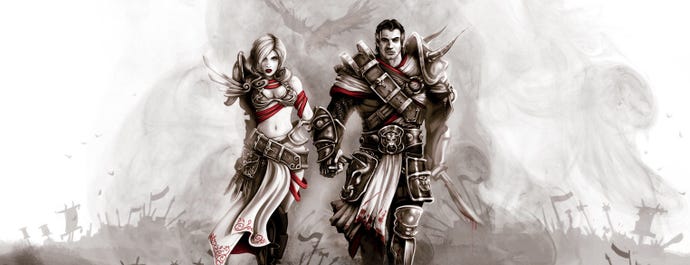2014 Recap: The Year's Best Games Have Been RPGs
It's been an even stronger year for RPGs than usual. Here are some of the best.
This article first appeared on USgamer, a partner publication of VG247. Some content, such as this article, has been migrated to VG247 for posterity after USgamer's closure - but it has not been edited or further vetted by the VG247 team.
Though some would argue it's been a weak year in general, it's been a fantastic year for RPGs. This year's crop has run the gamut from retro to modern, disarmingly simple to staggeringly ambitious. In all honesty, it's one of the best years for RPGs in a while. Here are the best of the bunch.

Bravely Default
Notable for: Going back to basics. Bravely Default is a return to the heyday of 8-bit and 16-bit RPGs. It also has a nice take on the job system.
Play it because: You yearn for the glory days of Final Fantasy V and Dragon Quest III
Old-school roleplaying fans sat up and took notice when Bravel Default arrived on the Nintendo DS back in February. A throwback to the days of the NES and Super NES, Bravely Default leans heavily on nostalgia for its appeal, but backs up those warm feelings of years past with some excellent systems—the most important of which is basically a take on Final Fantasy's classic Job System.
In USG's Bravely Default review, Mike wrote, "Bravely Default is an old-school Final Fantasy with the serial numbers filed off. It's pure original JRPG in the same way that Dragon Quest VIII was when it came out. You get the feeling that Silicon Studio just decided to pare things back to what worked back in the day, and focus on what made those things so good. It doesn't break much new ground; the Brave and Default systems change up your strategy, but really you're just moving around your command attacks. The job system is similar to what you've seen in Final Fantasy III, V, Tactics, and other games. You attack, you defend, you cast Cure, you cast Fire, you run into random encounters, you save before a boss. You've done this. We've all done this. Bravely Default is just so goddamn simple; if you like old Final Fantasy games, this is your comfort food.
Indeed it is. In many ways, Bravely Default succeeds where Final Fantasy: The 4 Heroes of Light failed, delivering a credible and attractive old-school RPG without irritations like the party constantly splitting up. It answers the cry by frustrated fans for Square Enix to get back to basics and make what they really want: A classic JRPG. Even if you're not in it for the nostalgia though, it's still worth playing. In contract to its relatively simple story, Bravely Default's deep class customization can take up hours by itself. It's the ideal portable RPG, and one of the Nintendo 3DS' best games of the years.
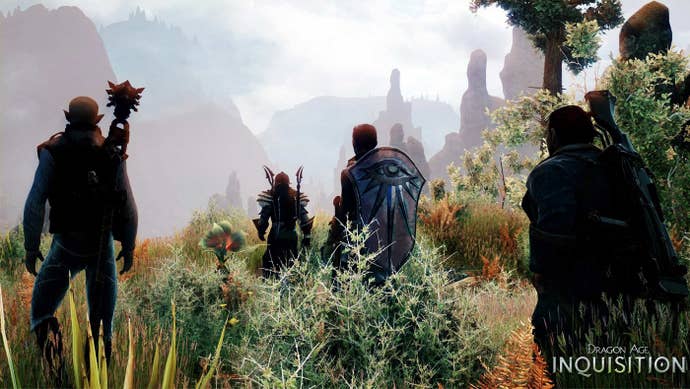
Dragon Age: Inquisition
Notable for: A beautiful world, strong storytelling, and being a return to form following a string of disappointments by BioWare.
Play it because: You want a big, beautiful console RPG that will last you a good 50-75 hours while successfully balancing action, depth, and solid storytelling.
I was skeptical that BioWare still had it in them to make a strong RPG—the disappointing Mass Effect 3 made it seem as if they had been fully assimilated by EA and lost whatever spark they might have once had—but Dragon Age: Inqusition proved me wrong. It is a bold and beautiful RPG that steadily picks up momentum as it goes along, marrying excellent setpieces with a decent amount of depth and exploration. I even like the story.
Ah yes, the story: The part of Dragon Age that people seem to criticize the most. I've had more than one friend grumble to me that they just don't find the world of Dragon Age that interesting, and I can understand why given how it's struggled to establish its own identity while lifting so much from A Song of Ice and Fire and other sources. Dragon Age: Inquisition deserves some credit though for developing its world and establishing a credible villain early on who encompasses many of the best aspects of its lore, namely the Darkspawn.
In my review I wrote, "As the story progresses, Dragon Age steadily raises the stakes, kicking things into high gear after a major battle that sees the Inquisitor and her forces move into Skyhold—a massive, derelict castle that serves as the Inquisitor's version of the Normandy. The story missions that follow are a real treat, most notably an Orlesian ball heavy with royal intrigue and a Helms Deep-style setpiece battle that brings in elements of both Dragon Age: Origins and Dragon Age II. The kicker is the moment following each story mission when you get to play Daenerys and judge defeated foes from your customizable throne, either sentencing them to death or sentencing them to some other, more insidious punishment. They're small moments in the grand scheme of things, but they add to Dragon Age: Inquisition's excellence.
Ultimately, I really enjoyed my time with Dragon Age: Inquisition, whether I was battling Red Templar from camp to camp or simply riding around on my War Moose, and I can't wait to play the inevitable expansions and resolve some of the dangling plot threads from the end of the game. Right now, Dragon Age: Inquisition is my personal Game of the Year.
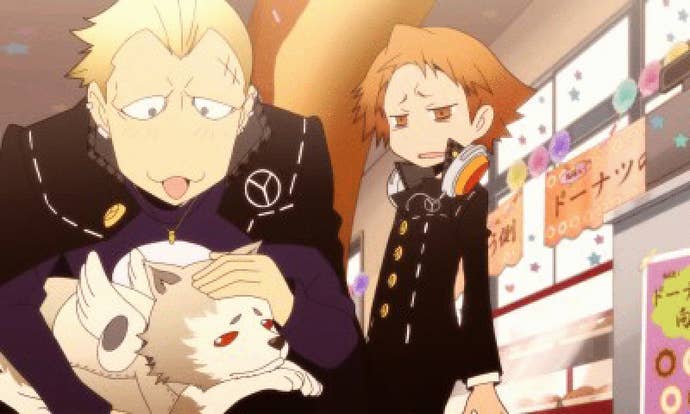
Persona Q
Notable for: Mixing the worlds of Persona and Etrian Odyssey to make an odd but memorable dungeon crawler.
Play it because: You want a hardcore dungeon crawler set in the colorful world of Persona.
Etrian Odyssey has long been something of an acquired taste. Fans dearly love its dungeon crawling, but it's been rightly criticized by even faithful followers for having a weak to non-existent story. In that sense, Persona Q is a match made in heaven, as its marries Etrian Odyssey's hardcore sensibilities with Persona's well-loved aesthetics and storytelling.
Our boss, of course, loved it. A longtime Etrian Odyssey fan, Jeremy opined in his review, "Persona Q knows what it is, and it runs with it. That is to say, it's a fairly grindy, hardcore RPG drowning in fan service, and it never pretends to be anything else. The characters lament the immense scale of the labyrinths, panic about the threat posed by the F.O.E.s, and banter uneasily the way any two tightly-knit groups of teenagers thrust together by circumstances would. The game, too, lampoons itself; the entire second labyrinth feels like it's building up toward something to do with the Social Links that define the Persona games' character romances only to take an amusing swerve at the last moment."
As Jeremy also points out in his review, the battle systems of Etrian Odyssey and Persona Q are a very nice in this context, both relying heavily on finding the element weakness of a foe (or F.O.E.) and exploiting it. As it turns out, the two have more in common than they first appear, and the result is another enjoyable RPG for the Nintendo 3DS.
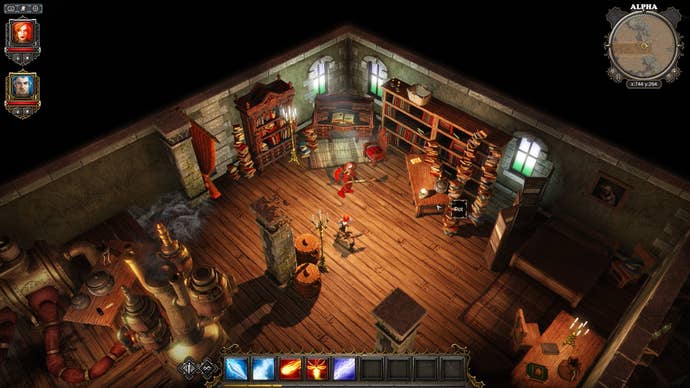
Divinity: Original Sin
Notable for: A fun sense of humor, excellent combat, and a world almost as large as the one in Dragon Age: Inquisition.
Play it because: You loved Ultima once upon a time and you're desperate for more. Or you just want a really good PC-style RPG.
Divinity: Original Sin came almost out of nowhere back in the summer, drawing favorable comparisons to the Ultima series with its deep roleplaying, excellent combat, and light touch. In much the same way as Bravely Default is meant to draw in those who loved Final Fantasy V back in the day, Divinity: Original Sin is built to recall the glory days of PC RPGs in the '80s and '90s—specifically Ultima.
Richard Cobbett put it well in his review for Eurogamer, "Simply calling the result a love letter to classic role-playing games does it a disservice. For starters, it's more of a mix-tape: a greatest hits collection that takes in everything from Ultima's world simulation (albeit lacking advanced elements like NPC schedules and day/night cycles) to the Chrono Trigger-inspired home base at the End of Time. It even takes a few trips into other genres, including a fourth-wall-breaking "show me the future" gag straight from the LucasArts jokebook. Original Sin wears its many tributes on its sleeve. It's proud to be a nostalgia trip that lets you find flour, mix it into dough, bake it and make your own packed lunch.
Again, like Bravely Default, there's a lot to love about Divinity even if you aren't an Ultima fan from way back. The combat is superb, with elements being used both offense and their useful side effects (fire helps burn out poison, among other things). The banter between the two player characters is also first-rate. And the polish is shockingly good for a game developed by a tiny team in Belgium with the help of Kickstarter.
Along with Shovel Knight and (perhaps) Elite: Dangerous, Divinity: Original Sin raises the bar for what to expect from independent developers working without the constraints of publishers. If Divinity: Original Sin is truly a harbinger of things to come, then the future of gaming is bright indeed.
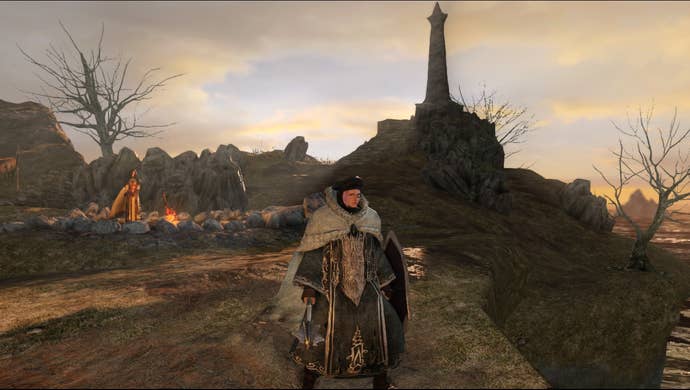
Dark Souls II
Notable for: Being really hard, having the best combat of pretty much any action game this side of Bayonetta 2, and implementing clever online features.
Play it because: You love the first Dark Souls, you enjoy hardcore action RPGs, or you're looking for a great community.
At this point, Dark Souls' challenge may be a bit overstated. It's often touted as the anti-AAA games—the game you go to if you want a game that doesn't stoop to holding your hand—but its strengths extend well beyond simply being hard. As documented by Bob in a cover story earlier this year, Dark Souls has an amazing community that is continually streaming and churning out new content. It also has some of the best boss battles ever—heart stopping affairs that frequently leave you feeling as if you're barely clinging to life.
But the true heart of Dark Souls II continues to be its phenomenal combat, which feels real in a way that is rare in a video game. When you strike an enemy, you can almost feel the clang of your sword reverberating back into your hands. It's a system that also rewards creativity and tactical thinking; and as has been discussed before, any enemy in Dark Souls can kill you with relative ease, even the most basic zombie, which has a way of keeping you on your toes.
But while it can be unforgiving, Dark Souls II also has an amazing support structure. Vast resources designed to get you on your feet with a decent character build are available online. And if you're struggling with a particular boss, you can always summon another player to give you helping hand. Add in the fact that Dark Souls II isn't as hard as either Dark Souls or its predecessor Demon's Souls, and even mid-level players can probably soldier through it.
Though not a huge step forward for the series in general, Dark Souls II remains a cut above ordinary RPGs as well as its growing number of imitators. If you haven't played it yet, you should go pick it up right now. In my opinion, Dark Souls and Dark Souls II are the two best games of the last generation.
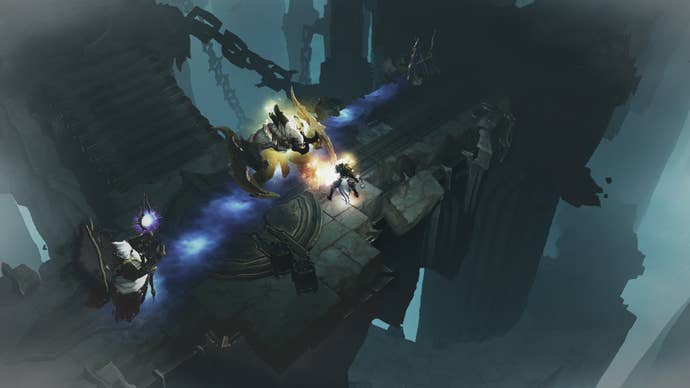
Diablo III: Ultimate Evil Edition
Notable for: Dramatically improving upon the original, being a great co-op RPG, featuring lots of loot.
Play it because: You have a couple friends that you want to go dungeon crawling with from the comfort of your couch.
I never thought I would say this, but I think Diablo III is better experienced on the PlayStation 4 and Xbox One than it is on the PC. True, the PC has a much more intense community, but the console versions have one advantage that the PC version simply can't much: couch co-op.
I've been playing Diablo III: Ultimate Evil Edition on and off since reviewing it with Jaz back in August, my most memorable playthrough being a four player co-op run through the campaign with my girlfriend here in San Francisco and two friends in Washington D.C.—a modern gaming experience if there ever was one. Diablo III is one of those games that can be as hard or as easy as you want, so it fits in nicely as both a hardcore RPG and a casual co-op RPG loaded with loot pinatas.
It's funny to think now of just how flawed Diablo III was when it launched. When it first arrived back in 2012, it was derided for its deeply flawed auction house, which made it easy to buy up equipment, as well as its repetitive campaign and poor loot distribution. Thankfully, Blizzard has taken the majority of those criticisms to heart and massively overhauled Diablo III, and the game is much better for it.
Ultimate Evil Edition represents the culmination of Diablo III's evolution from near laughingstock to one of the best RPGs on either the PC or console. It's an impressive improvement, and one that deserves to be experienced, especially if you happen to have some friends who will play with you.
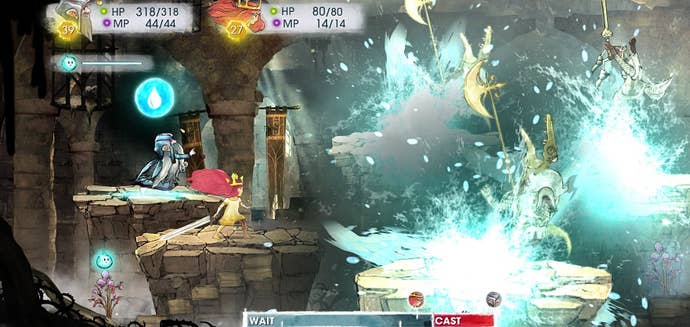
Child of Light
Notable for: Excellent soundtrack, nice take on Grandia's battle syste, memorable art style.
Play it because: You're looking for a beautiful, breezy RPG that mixes elements of old-school JRPGs and more modern design.
The biggest criticism I've heard of Child of Light is that's saccharine to the point of being sickening. But in light of gaming's continued infatuation with being as dark and edgy as possible—Grand Theft Auto V is Exhibit A—I find Child of Light refreshing. It's an entertaining little RPG with a lovely soundtrack and a memorable art style, all of which is buoyed by a surprisingly strong battle system.
The battle system, of course, is what drew me to Child of Light in the first place. I've always been partial to Grandia's mix of active and turn-based elements, in which two interruptable gauges race each other ahead of each action, and it finds solid expression in Child of Light. Perhaps more impressively, the team at Ubisoft Montreal demonstrates the confidence to modify the existing formula, with good results.
The most notable addition is a tiny firefly-like creature named Igniculus, who can be used to either impede enemies and slow their time bar or slowly heal allies. He's a powerful ally, but his abilities can't be abused too much since he will eventually be drained of power and forced to recharge. Like all good additions, Igniculus serves to enhance the rhythm of the battle system without unbalancing it, and is a great help in random encounters.
Child of Light is a relatively brief RPG, weighing in at around 12 hours; but as it happens, it's since become available for the PlayStation Vita, which is the perfect venue for a bite-sized RPG like this. Play it, enjoy it, and savor one of the more interesting RPGs of the past couple years.
The Best of the Rest
There are actually too many good RPGs to write about this year, so I'll highlight them as best I can right here. Wasteland 2 follows an all-time classic and purportedly lives up to the original, but time constraints have prevented me from playing it. Perhaps someone in the comments would like to comment?
I enjoyed Pokémon Ruby and Alpha Sapphire, but its relative lack of postgame content is once again a drawback. Perhaps DLC is on the way, though?
Destiny is an RPG as much as a shooter, but Jaz already highlighted it in his piece about shooters (note, it's also been a good year for shooters.
As I discussed in our new podcast, I really like Lightning Returns: Final Fantasy XIII. Jeremy and I wrote about it right here".
And finally, my secret favorite RPG experience of the year: FIFA 15. Yep.
Have a favorite RPG that I didn't mention? Share it in the comments. Now that I've got some time on my hands, it's time to dig into my backlog.
